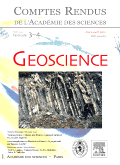
COMPTES RENDUS GEOSCIENCE
Scope & Guideline
Connecting Scholars with Groundbreaking Discoveries.
Introduction
Aims and Scopes
- Geodynamics and Tectonics:
Research in this core area includes studies on the processes driving the movement of the Earth's lithosphere, such as subduction, rifting, and the dynamics of fault systems. The journal publishes reviews and original research that contribute to the understanding of tectonic evolution and geodynamic models. - Petrology and Volcanology:
This area encompasses research on the composition, origin, and evolution of magmas and volcanic systems. Papers often focus on experimental studies, geochemical analyses, and field investigations that provide insights into volcanic processes and the petrogenesis of igneous rocks. - Hydrogeology and Water Resources:
The journal addresses topics related to groundwater flow, aquifer characterization, and hydrological modeling. It emphasizes the integration of hydrogeological data with environmental and climate change studies, making significant contributions to water resource management. - Paleontology and Stratigraphy:
Research in this scope includes studies of fossil records, stratigraphic correlations, and paleoenvironmental reconstructions. The journal highlights the importance of understanding geological history through the lens of paleontology and sedimentology. - Geochemistry and Environmental Geoscience:
This area focuses on the chemical processes and interactions in geological systems, including studies on contamination, biogeochemical cycles, and the environmental impacts of geological phenomena.
Trending and Emerging
- Climate Change Impact Studies:
There is an increasing emphasis on understanding the impacts of climate change on geological processes, particularly in relation to hydrology, sediment transport, and ecosystem responses. This trend is pivotal for developing adaptive management strategies. - Geothermal Energy Research:
Research focusing on geothermal systems and their potential for sustainable energy production is gaining traction, reflecting the growing interest in renewable energy sources and their geological foundations. - Geohazards and Risk Assessment:
Papers addressing the assessment and management of geological hazards, including earthquakes and landslides, are on the rise. This reflects a broader societal concern for disaster preparedness and risk mitigation in vulnerable regions. - Interdisciplinary Approaches to Geosciences:
There is a notable trend towards interdisciplinary research that combines geoscience with other fields such as biology, ecology, and social sciences, highlighting the interconnectedness of geological processes and human activities.
Declining or Waning
- Archaeoseismology:
While previously a focus area, studies related to archaeology and seismicity have decreased, possibly due to a shift towards more contemporary geological applications and methodologies that emphasize immediate environmental challenges. - Historical Seismology:
Research on historical seismicity and its implications has waned, likely as the field moves toward more quantitative and predictive models of seismic activity rather than retrospective analyses. - Mineral and Rock Properties Studies:
Investigations centered solely on the physical properties of minerals and rocks without broader contextual applications are appearing less frequently, as there is a growing trend towards integrating mineral studies with environmental and technological applications.
Similar Journals

EARTH AND PLANETARY SCIENCE LETTERS
Connecting Geoscience Insights to Global ChallengesEARTH AND PLANETARY SCIENCE LETTERS, published by ELSEVIER, stands as a premier academic journal in the fields of Earth and Planetary Sciences, Geochemistry and Petrology, Geophysics, and Space and Planetary Science. Since its inception in 1966 and continuing to 2024, the journal has consistently maintained an impressive reputation, ranking in the top quartile (Q1) across several categories, highlighting its vital role in advancing scholarly research. With a Scopus ranking of #4 in both Geophysics and Geochemistry and Petrology, and a notable 97th percentile in multiple Earth sciences categories, EARTH AND PLANETARY SCIENCE LETTERS provides a platform for groundbreaking research, encouraging rigorous investigation and dissemination of knowledge. While not available as an Open Access publication, the journal remains highly accessible to academics and professionals worldwide, providing invaluable insights and fostering discussions that influence the future of Earth sciences. Whether you are a researcher, educator, or student, this journal is a crucial resource for understanding our planet and its processes.
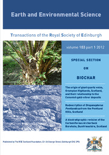
Earth and Environmental Science Transactions of the Royal Society of Edinburgh
Connecting research with real-world environmental applications.Earth and Environmental Science Transactions of the Royal Society of Edinburgh is a prestigious journal published by Cambridge University Press, dedicated to advancing research in the field of Earth and planetary sciences, as well as environmental science. With its ISSN 1755-6910 and E-ISSN 1755-6929, the journal has established itself as a crucial platform for disseminating innovative research and comprehensive reviews since its inception in 2007. Positioned in the Q3 quartile for both Earth and Planetary Sciences and Environmental Science, it contributes significantly to the ongoing dialogue and development in these areas, boasting a Scopus ranking that reflects its commitment to scholarly excellence with an emphasis on interdisciplinary approaches and real-world applications. The journal is based in the United Kingdom, with its editorial office located at the Edinburgh Building, Shaftesbury Road, Cambridge. As an essential resource for researchers, professionals, and students alike, Earth and Environmental Science Transactions offers opportunities for open discourse on pressing environmental challenges, fortifying its role in fostering a deeper understanding of our planet's systems and their interconnectedness.
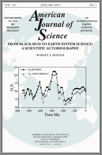
AMERICAN JOURNAL OF SCIENCE
Illuminating the Path of Earth Science InnovationThe American Journal of Science, published by the esteemed Amer Journal Science, stands as a leading platform for groundbreaking research in the field of Earth and Planetary Sciences. With an impressive impact factor and distinguished Scopus rank 34/195 in its category, the journal occupies a prestigious position in the academic community, reflecting its high-quality and influential contributions to scientific knowledge. The journal’s objective is to disseminate original research, comprehensive reviews, and critical discussions that advance our understanding of geological processes and planetary phenomena, supporting scholars and practitioners in their pursuit of knowledge. Despite its traditional publication structure, viewers can explore its rich repository of works dating from 1945 to present, offering a wealth of insights into the dynamic Earth sciences. The journal remains a vital resource for researchers, professionals, and students eager to engage with the latest scientific findings and foster further innovation in the field.

INTERNATIONAL JOURNAL OF EARTH SCIENCES
Pioneering Research for a Sustainable FutureINTERNATIONAL JOURNAL OF EARTH SCIENCES, published by Springer, is a leading journal in the field of Earth and Planetary Sciences, distinguished by its Q1 quartile ranking in the 2023 category of Earth and Planetary Sciences (miscellaneous). With an ISSN of 1437-3254 and an E-ISSN of 1437-3262, this journal has been a pivotal platform for researchers, academics, and practitioners since its inception in 1996. The journal's focus encompasses a broad range of topics within Earth sciences, making it a vital resource for contributions that enhance our understanding of geological processes, climate change, and planetary dynamics. The impact factor reflects its high standards and the significance of the research it publishes, ranking it in the 74th percentile among its peers as per Scopus. Furthermore, the journal offers Open Access options, facilitating the global dissemination of groundbreaking research. The editorial team is committed to advancing knowledge in Earth sciences, serving as an essential reference for students and professionals looking to engage deeply with this dynamic field.
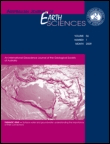
AUSTRALIAN JOURNAL OF EARTH SCIENCES
Bridging Theory and Practice in Earth SciencesAustralian Journal of Earth Sciences, published by Taylor & Francis Ltd, has established itself as a leading journal in the field of Earth and Planetary Sciences since its inception in 1984. With an impactful reach reflected in its ranking as Q2 in the Earth and Planetary Sciences category, the journal contributes significantly to the advancement of knowledge through rigorous peer-reviewed research. While it is not Open Access, the journal ensures broad accessibility through institutional subscriptions and various academic platforms. With a commitment to covering diverse topics within the Earth sciences, including geosciences, geology, and environmental studies, the Australian Journal of Earth Sciences is an essential resource for researchers, professionals, and students seeking to deepen their understanding of the dynamic processes that shape our planet. Engaging with the journal means being part of a vibrant community that aspires to push the boundaries of scientific inquiry and innovation in Earth sciences.
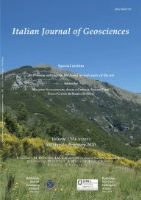
Italian Journal of Geosciences
Exploring Earth's Mysteries: Unveiling the Science BeneathItalian Journal of Geosciences, published by the Società Geologica Italiana, is a distinguished platform for the dissemination of research in the fields of Earth and Planetary Sciences and Geology. With an impressive impact factor reflected in its 2023 rankings, where it placed in the Q3 category across its related fields, this journal serves as a vital resource for academics, practitioners, and students. Established in 2010 and poised to continue until 2024, the journal showcases critical advancements and interdisciplinary studies that deepen our understanding of geological processes and Earth systems. Operating under open access options, it offers robust accessibility to a broad audience, facilitating wider dissemination of knowledge. The journal's affiliation with Università degli Studi La Sapienza in Rome, Italy, further underscores its commitment to academic excellence and innovation in geosciences.
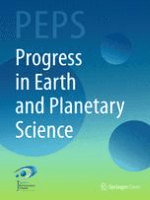
Progress in Earth and Planetary Science
Advancing the frontiers of Earth and planetary research.Progress in Earth and Planetary Science is a premier open-access journal published by Springer, dedicated to advancing the field of Earth and planetary sciences. Since its inception in 2014, this journal has emerged as a prominent platform, achieving a Q1 ranking in the Earth and Planetary Sciences category, reflecting its high impact and rigorous peer-review process that ensures the highest quality of published research. With its broad scope encompassing diverse subfields within the Earth sciences, the journal aims to foster interdisciplinary collaboration and innovation among researchers, professionals, and students. The journal's commitment to accessibility through its open access model promotes the dissemination of knowledge globally, allowing critical research findings to be shared widely within the scientific community. Located in the United Kingdom, Progress in Earth and Planetary Science continues to play an essential role in shaping the future of Earth and planetary research from 2014 to 2024 and beyond.

China Geology
Exploring the Depths of Earth SciencesChina Geology, published by KEAI PUBLISHING LTD, is a leading open-access journal that serves as a pivotal platform for disseminating high-quality research across a wide spectrum of Earth sciences. Since its inception in 2018, the journal has rapidly established itself with an impressive Q1 ranking in multiple critical categories, including Geology, Economic Geology, and Oceanography, among others, reflecting its significant contribution to the academic community. Positioned as a top-tier journal in the Earth Planetary Sciences domain, it ranks #22 out of 321 in Geology and exhibits an admirable impact in sub-fields such as Earth-Surface Processes and Geochemistry and Petrology. China Geology is committed to promoting rigorous scientific inquiry and facilitating the open exchange of knowledge in the geosciences, making it an essential resource for researchers, professionals, and students eager to explore innovative developments and fundamental advances in geology. The journal’s accessibility ensures that critical findings reach a broad audience, thereby enhancing collaboration and driving forward scientific discourse in the global community.

Moscow University Geology Bulletin
Exploring Earth's Mysteries Through Rigorous ResearchMoscow University Geology Bulletin, published by SPRINGER INT PUBL AG, is a prominent platform for disseminating critical research in the field of Earth and Planetary Sciences. With an ISSN of 0145-8752 and an E-ISSN of 1934-8436, this journal is well-regarded for its contributions to diverse geological studies and interdisciplinary advancements that shape our understanding of the planet. The journal has established itself in the academic community, particularly noted for its ranking in the Q3 category within Earth and Planetary Sciences as of 2023. Despite its limited open-access options, the Moscow University Geology Bulletin remains an essential resource for researchers, professionals, and students through its well-curated articles and synthesis of geoscientific knowledge. With annual volumes converging from various years, including significant years like 2012 to 2024, it aims to uphold its mission of fostering scholarly dialogue and innovation in the geosciences.
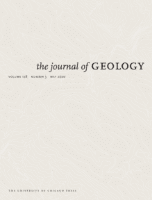
JOURNAL OF GEOLOGY
Innovative Research Shaping Our Understanding of Geology.The JOURNAL OF GEOLOGY, published by University of Chicago Press, serves as a premier platform for disseminating groundbreaking research in the field of geology. Established in 1973, this esteemed journal has consistently ranked in the Q2 category in geology, further solidified by its Scopus ranking, where it is positioned at 99 out of 321 in Earth and Planetary Sciences, marking it in the 69th percentile of its category. With an emphasis on innovative and interdisciplinary studies, the journal features peer-reviewed articles that contribute to the understanding of geological processes, earth materials, and environmental interactions. Although it does not currently offer open access, it facilitates broad access through academic institutions to reach a global audience of researchers, professionals, and students striving to advance the knowledge of Earth's history and dynamics. As a vital resource for the geology community, the JOURNAL OF GEOLOGY plays an essential role in fostering scholarly dialogue and advancing both academic inquiry and practical applications in geology.